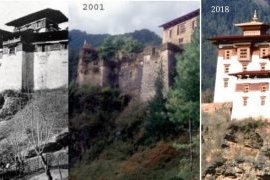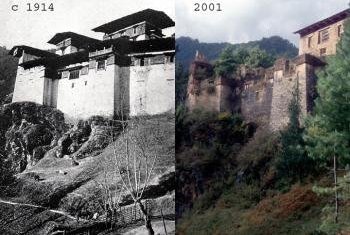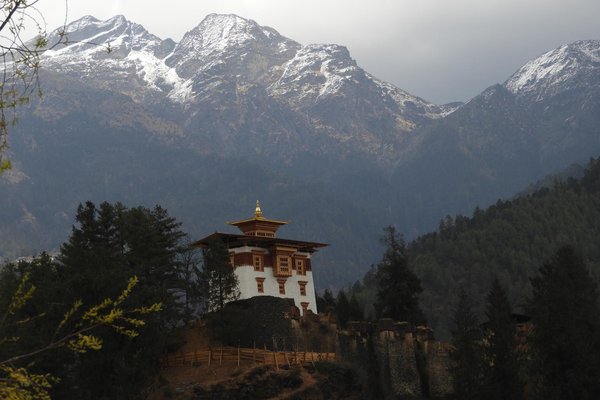Bhutan
Ancient Ruin of Drukgyel Dzong
The Ancient Ruin of Drukgyel Dzong represents a purely defensive dzong without religious or administrative role. It is strategically located near the border with Tibet. It originally dated from 1649 but was destroyed by fire in 1951. There are plans to reinstate it to its former glory.
Site Info
Official Information
- Full Name
- Ancient Ruin of Drukgyel Dzong (ID: 5694)
- Country
- Bhutan
- Status
-
On tentative list 2012
Site history
History of Ancient Ruin of Drukgyel Dzong
- 2012: Added to Tentative List
- Added to tentative list
- Type
- Cultural
- Criteria
Links
- UNESCO
- whc.unesco.org
All Links
UNESCO.org
- whc.unesco.org — whc.unesco.org
Community Information
- Community Category
- Secular structure: Military and Fortifications
Travel Information
Recent Connections
News
No news.
Recent Visitors
- ReallyDeepThoughts
- GerhardM
- Roman Bruehwiler
- Javier Coro
- Bram de Bruin
- Vernon Prieto
- Thomas Buechler
Visitors of Ancient Ruin of Drukgyel Dzong
Community Reviews
Show full reviews
King of Bhutan: “In celebration of my son's birth by my beautiful wife I hereby announce the renovation of the Drukgyel monastery.”
Ministry of Tourism: “But, my dragon king, as beautiful as your wife may be, we just placed the monastery on the list of tentative works heritage sites as ruins. If we renovate it the entire work will be in vain.”
Zoë: “Honestly, this never had a chance to begin with because you are basing the unique value of the ruins on it never having been changed since its original construction and having just a few brick walls left doesn't show that, at all.”
Bagan Tourism: “We rebuilt everything and will get on the list eventually…”
The guides were a little confused why I asked to see it. It takes a 20 min ride on good road west of Paro and past the entrance of the Tiger's Nest. I still find it beautiful like everything in Bhutan, with a good view of the sacred Jomolhari mountain. There are a few parking spots, a restaurant, trash (unfortunately, and their usual excuse for the Indian tourists to dump it out of the window doesn't apply in this remote spot), and lots of workers getting it ready for a grand re-opening. The guides claim it is 40% complete although from the outside you couldn't tell as it already looking redone. It is not open for public, one could walk around if they wanted to, but the best views …
Keep reading 0 comments
The presence of this site on Bhutan’s T List came as a surprise to me as we had (apparently) visited it back in Autumn 2001 without any great feeling of having visited somewhere significant!
It consists of a ruined dzong situated 14 kms north of Paro not far from the path up to the Tiger’s Lair. It only became “ruined” in 1951 by fire – an “occupational hazard” for Bhutanese buildings with all those butter lamps around – although poor wiring seems to be the most common cause nowadays! Of course, European countries happily inscribe ruined castles etc, so I suppose there is no particular reason why a ruined dzong couldn’t also gain inscription. On the other hand, Bhutan isn’t exactly short of perfectly good “living” dzongs to choose from! Nevertheless the UNESCO introduction describes the ruins in glowing terms – “The ancient ruin of Drukgyel Dzong, considered as the most beautiful and famous archaeological sites in Bhutan”. Indeed the introduction also tries to make a merit out of the dzong’s ruined state in a somewhat double edged argument which seems to call into question the authenticity of the country’s other dzongs - “The Dzong was never reconstructed since 1951 fire. It was freed from any form of changes as opposed to other Dzongs, which were subjected to major renovation and alteration in order to integrate new functions and usages into old structures, accelerated by the process of modernization and development.”!
At the time, we had gathered the impression that …
Keep reading 0 comments
